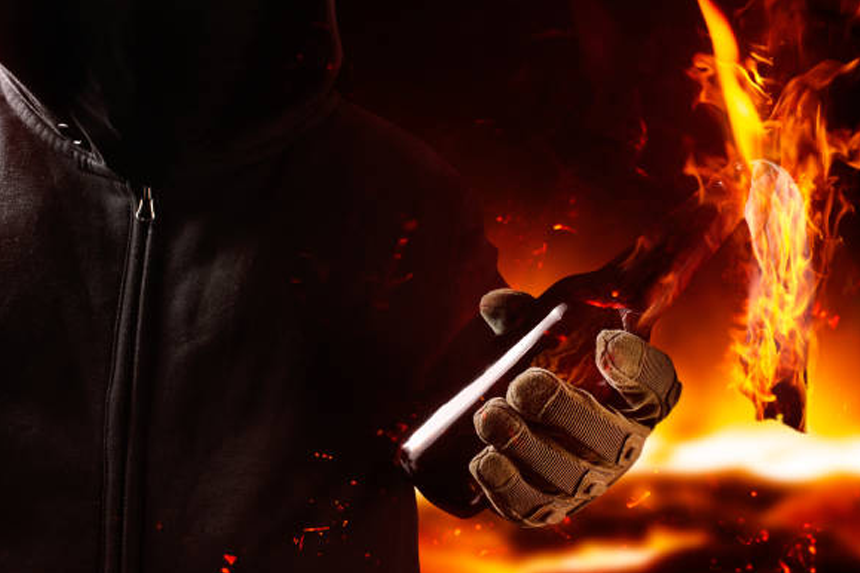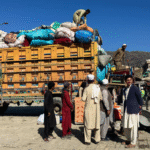Monday’s dissident republican march in Londonderry resulted in an unsettling petrol bomb attack directed on police personnel. Led by approximately fifty people wearing paramilitary-style uniforms, the procession headed from the Creggan district to Free Derry Corner in the Bogside. Multiple petrol bombs and pyrotechnics were hurled at the police, stationed at the Derry Walls, observing the procession for public safety.
Organizing the procession, the National Republican Commemoration Committee says it was a respectful honoring of the 1916 Easter Rising. Still, the actuality of the event differed greatly from these assertions. Originally a peaceful procession, it soon turned violent, posing questions regarding public and law enforcement officer safety. The authorities moved quickly to contain the crisis, sealing sections of the city’s walls and guiding the public away from the area.
Why were the Petrol Bombs thrown?
Tensions rose as the procession passed the city, resulting in the launching of petrol bombs and pyrotechnics against police personnel positioned at Nailors Row, overlooking the Bogie. These strikes broke the Parades Commission’s policies by being illegal as well as aggressive. The commission decided not to allow wearing paramilitary-style clothes or displaying flags connected to banned groups. Still, those in the procession disregarded these limitations, which added to the growing hostility.
Acting quickly, the police set up a proactive policing program meant to stop more disturbances. Closely observing the area, Land Rovers’ police were ready to react to any threats. Two men, aged thirty and fifty-five, were arrested under the Terrorism Act after police stopped cars in the Frances Street and Fanad Drive areas following the march. These arrests underline the authorities’ will to stop the violence connected with such demonstrations.
The violence went beyond the petrol bombs. Targeted with pyrotechnics and even masonry, hurled by people trying to provoke more chaos, the police were The police reaction stopped the situation from getting much worse. Still, the participation of young people in these horrific crimes is alarming. Those who seemed to be employing younger people as shields to guard the more ordered, masked attackers threw petrol bombs.
Why Is This Parade So Controversial?
For numerous reasons, the Londonderry procession has become a hot topic of debate. Coordinated by the National Republican Commemoration Committee, the event closely relates to dissident Republican organizations. These organizations—including the New IRA—have past been involved in many acts of violence; their attendance at such memorials has caused public and official concern.
Clear instructions for the event had been published by the Parades Commission. It forbade participants from donning paramilitary-style outfits and from displaying flags connected with banned groups. Notwithstanding these prohibitions, many participants in the procession freely broke them; several wore paramilitary-style attire and carried flags linked to outlawed groups. This rule-breaking added to the already tense environment and complicated the police’s task of preserving peace.
The argument about the procession is not fresh. Similar events last year resulted in gasoline bombs being hurled at reporters and multiple automobiles catching fire. These episodes strengthened the link between the procession and violent behavior, therefore highlighting the fact that such gatherings usually cause anarchy and disturbance. The Parades Commission itself has admitted, in reality, that past events have been connected to significant criminal activity, therefore augmenting the already great public safety issue of concern.
What actions are being taken to stop more violence?
The police have intensified their attempts to stop further occurrences in response to the petrol bomb attack and growing violence. Officers started a proactive search following the attack, stopping cars and grabbing several goods from a van. These acts were a component of a larger campaign to reduce the violence and guarantee that like events never recur in the future.
Regarding their aims to stop violence connected to these gatherings, the authorities have been unambiguous. The Police Service of Northern Ireland, or PSNI, has promised to keep a closer eye on such parades and act as needed interventionists. Furthermore, the Parades Commission has made it abundantly evident that it will keep rendering decisions about such events, thereby guaranteeing that all participants follow the law and refrain from behaviors likely to cause violence.
The exploitation of young people by those engaged in the violence was one of the main issues the police voiced. Those who seemed to be using young people to cover the more aggressive, masked attackers throwing petrol bombs seemed to be Authorities have denounced this strategy of child criminal exploitation and underlined the need to safeguard weaker people from being driven into criminal activity.
Apart from the immediate responses of the police, long-term measures are also much needed. Working with different community organizations, the authorities are addressing the underlying causes of violence and making sure that next memorials do not cause disturbance. Law enforcement officials want to establish confidence and stop more violence related with these parades by interacting with nearby communities.
What Long-Term Effects Result from Such Violence?
The violence surrounding the petrol bomb assaults during this procession affects the stability and safety of the area long-term, not only momentarily. Using petrol bombs and other kinds of violence compromises the fragile peace Northern Ireland has painstakingly created from the Good Friday Agreement. Parades like this one can help to revive long-standing conflicts and support the instability afflicting the area for decades.
Young people participating in these violent crimes especially raises questions since it emphasizes the continuous issue of radicalization and the exploitation of weaker people. Petrol bombs thrown by young people underline even more the need of more efficient treatments to stop young people from becoming involved in criminal activities. The authorities must tackle this problem head-on if we are to avoid letting next generations get caught up in bloodshed.
Moreover, the link between such violence and dissident republican organizations begs issues concerning the political scene of Northern Ireland going forward. It gets more difficult to create a peaceful, stable society while these groups keep planning and executing violent attacks. Whether Northern Ireland can keep its peace or whether it will be thrown back into the turbulence of its past will depend critically on the way the police and other authorities handle such occurrences.
Conclusion
The latest petrol bomb attack during the dissident republican procession in Londonderry reminds us sharply of the difficulties state administration and law enforcement face in handling such events. Although the authorities have responded quickly to handle the violence and guarantee public safety, the episode emphasizes the continuous threat that dissident republican organizations create and the violence they perpetrate.
The importance of constant alertness and aggressive actions is shown by the exploitation of young people, the disrespect for marches Commission recommendations, and the violence accompanying earlier marches. While the authorities have to keep trying to stop such violence, they also have to cooperate with nearby populations to solve the fundamental reasons of radicalism and criminal activity. Northern Ireland can only guarantee that future celebrations avoid turning into violence by working together, therefore enabling the area to head toward a more peaceful future.








